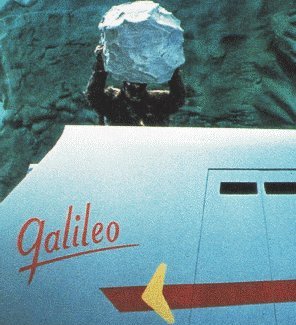TOS: Episode 16: Galileo Seven
Okay, this is awesome. Sci-fi is starting to show itself more and more in The Original Series--in this case it turns out the discovery of a quasar is our one scifi allusion. However, "Galileo Seven" primarily offers us insight into political-emotional concerns.
The episode opens with a political situation in which Kirk is opposing the opinion of an onboard Ambassador in favor of sending an away team, complete with the standard human-expendables, led by our loverly Spock into exploring a newly discovered "quasar, or quasar like phenomenon."
Episode Quick Summary
The Enterprise is in the midst of delivering medical supplies to Makus III, a planet infected by plague. Along with the supplies, the Enterprise is also transporting a High Commissioner--an ambassador for the planet. In the midst of the journey to Makus III, the ship encounters a quasarlike phenomenon. Star Fleet has placed Kirk under general orders to explore all such phenomenon, and with more than enough time to minimally explore the phenomenon and still make the medical rendevous, Kirk orders an away team to investigate the discovery via shuttle craft. In doing so excess ion radiation sends the shuttle off course, causing it to crash aboard a previously unexplored planet. In the midst of repairing the shuttle craft, "huge furry creatures" are discovered and begin to attack the away team. The same radiation effects the sensing instruments of the Enterprise, thereby making it almost impossible to locate the away team, and yet Kirk must try, under the time deadline of the medical delivery.
Episode Tidbits
The political situation goes deeper than merely conflict with the Ambassador, however. The current mission for the Enterprise is to deliver medical supplies to a plague ridden planet. The ambassador is aboard for the rendevous in which the Enterprise will deliver the supplies. En route to the planet, the Enterprise discovers Murasaki 312, an electromagnetic phenomenon that zaps the ship and the away team with ions, thus obliterating all sensors. In this way, the Enterprise and the away team end up absolutely separated from each other with the main ship having to guess where to look for the away team's shuttle craft. Six humans--including Scotty, and McCoy--and Spock end up on an unexplored, life supporting planet with Spock as their leader. However, unhappy with their new circumstances, and buzzed through with excessive radiation the away team begins to question his leadership.
The ambassador aboard the Enterprise poses a new problem for Kirk. For the first time he faces the presence of someone with greater authority than himself. Kirk has decision making authority, but only to a point. Once the deadline to appropriately arrive at the medical rendevous arrives, the High Commissioner's authority overrides Kirk's and the commissioner can demand that the Enterprise leave without the away team.
There is a common lesson being made through the presence of the ambassador on the Enterprise and with Spock and the away team on the planet. In both cases, the two have inadequate care for the feelings of others, thus troubling the demands of leadership in each case. Kirk's struggle, first of all, comes in facing the fact that for the first time he has someone aboard with greater authority (in some decisions) than himself. The ambassador, in the end, can demand that the Enterprise depart without the away team. The ambassador, however, so thoroughly denies the emotional situation of losing the away team that he ends up commenting only to chastize Kirk and act as a pressure cooking reminder of the time limit the search is operating under. On the planet, Spock continually ignores the emotional needs of the human away team members in preference of focusing on the logistical goals of getting the shuttle back up off the planet. In doing so, he alienates himself from his team, thus causing them to doubt his authority. In both instances, we see that emotional appeal and care is a necessary component of wise leadership. Spock's logic, though adequate to choosing the right course of action for their situation, is inadequate to convince his crew that his choices are appropriate. As a result, his logic would have them fail, even as it is the basis of their survival and success.
Episode Quotations
"We could use a little inspiration!" --Unnamed Female Yoemen to Spock
"I'm sick and tired of your logic!" --Lt. Boma to Spock
"Strange. Step by step I've made the correct and logical decisions, and yet, two men have died!" --Spock
"A little less analysis, and more action. That's what we need, Mister Spock!" --McCoy
...
"Your last act, Mister Spock. It was all you." --McCoy
"It was completely illogical." --Spock to McCoy
"That's exactly what I mean." --McCoy in response
...
"I examined the problem from all angles, and it was plainly hopeless. Logic informed me that under the circumstances the only possible action would have to be one of desperation. Logical decision, logically arrived at." --Spock explaining what McCoy above called Spock's final act to Captain Kirk
"You mean, you reasoned that it was time for an emotional outburst." --Kirk's response
"Well, I wouldn't put it in those terms, Captain. But those are essentially the facts." --Spock
The Entire Star Trek Universe at High Speed
Subscribe to:
Post Comments (Atom)







No comments:
Post a Comment